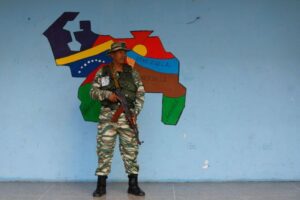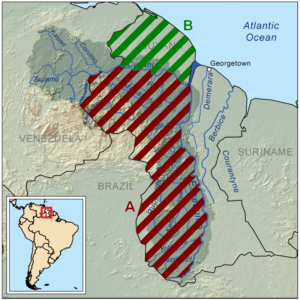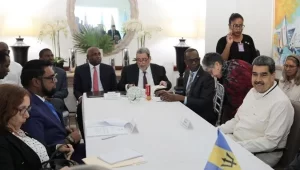|
Getting your Trinity Audio player ready...
|
Reading Time 4 mins
December 22, 2023
‘The OAS and other military pacts are multilateral. The escalating presence of the US military, its Southern Command, military exercises, etc, is only the other side of the coin of Venezuela’s military build-up. Both engage in dangerous saber-rattling and push toward military conflict rather than a win-win negotiated resolution. The US must not be allowed to push this region into the kind of savage war that is going on in the Middle East right now.’
 The goal of conflict resolution is to arrive at a resolution that is beneficial to all the parties. This is often described as a win-win solution. Both political leaderships play a dangerous zero-sum (winner takes all) game in the Guyana-Venezuela border dispute. Venezuela has said it rejects any arbitration by the ICJ, claiming that the ICJ has no jurisdiction.
The goal of conflict resolution is to arrive at a resolution that is beneficial to all the parties. This is often described as a win-win solution. Both political leaderships play a dangerous zero-sum (winner takes all) game in the Guyana-Venezuela border dispute. Venezuela has said it rejects any arbitration by the ICJ, claiming that the ICJ has no jurisdiction.
The Venezuelan leadership has continued to ramp up the antagonistic rhetoric and decided on measures to issue licenses to exploit its natural resources and even citizenship to Essequibo residents while maintaining an escalated military presence at the border.
The Guyanese leadership has rejected any notion of bilateral discussion with Venezuela, with or without a mediator, on the border dispute. On December 9, the Guyanese President said, “Guyana’s land boundary is not up for discussion.” Why? “…as it is currently before the ICJ …”. The “case before the ICJ will not be an issue for bilateral discussions.”
The principles of global international relations since the founding of the United Nations and the agreement of the UN Charter include non-interference in the internal affairs of any state or people, resolution of disputes between and among states by peaceful means, and the avoidance of military conflict in the conduct of relations between and among states.
The Guyanese position of refusing to discuss the conflict over the border issue with Venezuela is as untenable as Venezuela’s refusal to accept the jurisdiction of the ICJ. The Guyana President also said it “will continue to engage our bilateral partners on defense cooperation pacts…”.
What are bilateral defence pacts?
The OAS and other military pacts are multilateral. The escalating presence of  the US military, its Southern Command, military exercises, etc, is only the other side of the coin of Venezuela’s military build-up. Both engage in dangerous saber-rattling and push toward military conflict rather than a win-win negotiated resolution. The US must not be allowed to push this region into the kind of savage war that is going on in the Middle East right now.
the US military, its Southern Command, military exercises, etc, is only the other side of the coin of Venezuela’s military build-up. Both engage in dangerous saber-rattling and push toward military conflict rather than a win-win negotiated resolution. The US must not be allowed to push this region into the kind of savage war that is going on in the Middle East right now.
On December 1, the ICJ, in its order, urged Guyana and Venezuela to resolve the border issue more complexly. That was a call on both parties, not just Venezuela, to avoid provocations or anything that could be perceived as threats. The increasing involvement of the US and its military in Guyana is a provocation and not in the interest of any peaceful or bilateral resolution of the longstanding conflict.
When disputing parties are before any Court for adjudication (i.e., for a resolution imposed by a third party), the parties themselves are never barred from seeking a bilateral resolution of arriving at a settlement, which can then be recorded as a Consent Order by the Court. So, Guyana’s President’s statement that “the case before the ICJ will not be an issue for bilateral discussions” goes entirely against the practice and principles of voluntary mutually acceptable dispute resolution to any conflict.
That position by Guyana is not moral or practical. No discussion and negotiation is ever not an option. It is a position that seeks to inflame the situation and flouts the ICJ’s warning to both parties to do nothing to make resolving the dispute more difficult. Refusal to hold discussions and negotiations, even in situations of war, can never be a position of principle.
By holding to that position, Guyana’s President’s words about “ensuring that the region remains a Zone of Peace” sound hollow. The Guyana President’s assurances to the US oil barons that there will be “no changes or alterations to existing arrangements” shows a misplaced priority over the interests of the Guyanese People and for peace in the region. Any support for such a rigid and unrealistic position by any CARICOM member country is contrary to the very position of CARICOM about the area being a Zone of Peace and only pushes a peaceful and mutually acceptable resolution to the dispute further away.
What is needed is assistance to both parties to encourage a win-win resolution of this conflict to which the old and new colonial powers have contributed through their wars and zero-sum conflagrations in the past. The big powers must not meddle in this dispute or the relations between the parties to the conflict. With both being full or associate members of CARICOM, the regional body is responsible for encouraging both parties to use every means possible to seek a win-win resolution.
BIG POWERS, HANDS OFF GUYANA AND VENEZUELA!
STOP THE SABRE-RATTLING AND WORK FOR A WIN-WIN RESOLUTION!
RESOLUTION MUST NOT BE PUT OFF AGAIN AS IN THE PAST!
Return to BDN’s Introduction.
____________________________________________________________________________
Clyde Weatherhead
 A Citizen Fighting for Peace and Resolution of Conflicts and No War in our Region of the World.
A Citizen Fighting for Peace and Resolution of Conflicts and No War in our Region of the World.

